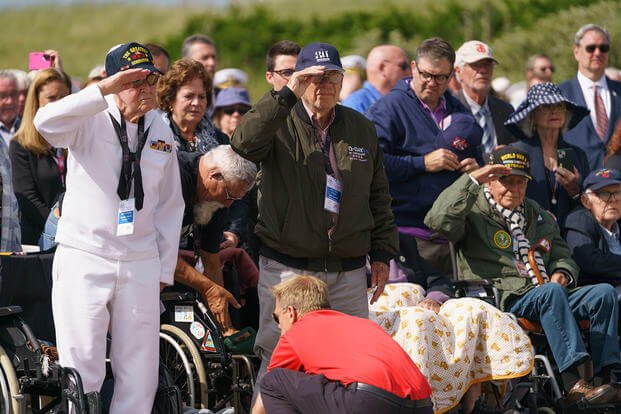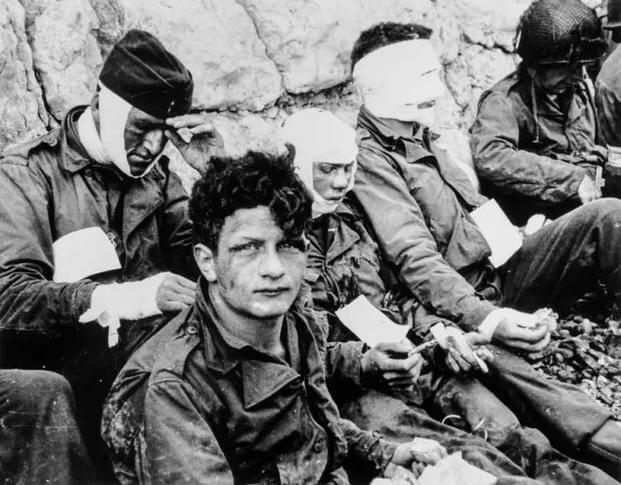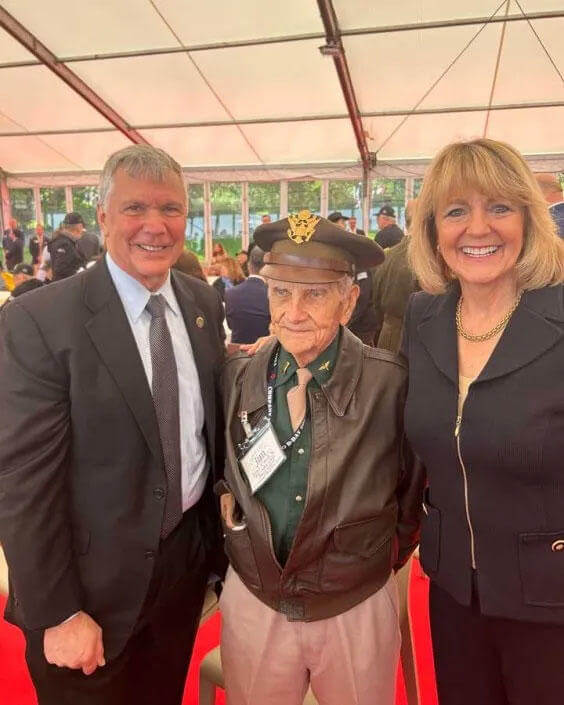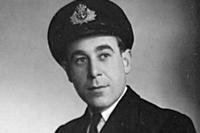This article first appeared on The War Horse, an award-winning nonprofit news organization educating the public on military service. Subscribe to their newsletter.
The windswept English Channel pounds itself onto the beaches of Omaha, Utah, Gold, Sword, and Juno, and it tears and claws at Pointe du Hoc and other rocky vistas, just as it did more than 80 years ago. It will eventually return these places to the sea, but, for now, they stand firm and remind us of what had been.
So, too, do the gravesites of 9,389 resting at the Normandy American Cemetery, along with 1,557 names of the missing inscribed on the walls. This serene and beautifully maintained tribute to service and sacrifice belies the chaos that took place eight decades earlier.
As part of the 80th anniversary of the D-Day landing in 2024, my wife and I joined colleagues from the American Battle Monuments Commission and more than 10,000 visitors at Normandy. Also with us that day were nearly 200 World War II veterans.
This was their day, and while they moved more slowly than they did when they were part of the greatest fighting force ever assembled, they stood incredibly tall and proud in the minds of people who understood that their fragile gift of freedom to us must be treasured and protected.
More than 20 million Soviets died in World War II. Six million Jews were killed. The United Kingdom hung by a thread, and Hitler invaded or occupied 20 nations. Had these men and women not fought and died on foreign soil on June 6, 1944, and all the other days we were engaged in World War II, the hallowed ground at Normandy would likely rest under the blackness of a swastika.
They are often called the Greatest Generation. They didn’t select that name; it was given to them as a sign of respect.

My wife and I had served for over 60 years combined, beginning long after their service ended. During our tenure, we had met military giants, including Medal of Honor recipient Brig. Gen. George “Bud” Day, whom Sen. John McCain, a fellow Vietnam POW, called “the bravest man I ever knew.” We had sung “God Bless America” alongside the late Brig. Gen. “Robbie” Risner, a Vietnam POW who had served in three wars.
We had held the hand of an American airman who had lost the majority of the right side of his head in Iraq. We touched a thousand headstones of dead service members with stories known only to God and told a mother that we would never forget her son, a young man we never met, who was killed in 2003 in the mountains of Afghanistan.
Despite all the sacrifices of those who fought in wars after WWII, we walked with great humility in the footsteps of the veterans of the Normandy landing. Did we even belong here? At Omaha? Had we earned the privilege to stand where so many fell? The valor that was everywhere 80 years ago was here at the anniversary event, and it pressed on us.
There is no competition among generations. The veterans of one war will never ask the veterans of another war to bend a knee. Instead, they will offer a hand, a salute, and endless respect. That is what we did at the commemoration for this “Greatest Generation.”
The sea, once red with blood, was now azure. The bullets, smoke, and flames that brought the taste, smell, and screams of war to so many were long since gone. The skies were clear of clouds and a gull circled free in the breeze above.
A lone young man stood where the waves lapped the sand, dressed in a 1940s military uniform. He looked out toward the sea while holding an American flag with the staff pushed into the sand. He rendered a solemn, slow, and dignified salute. People remembered in their own way.
Sixty years earlier, my dad leaned in across the table. He peered intently at me through his glasses, gently stirring a rusty nail, his favorite drink. My mom sat upright by his side. She knew something important was headed my way.
We had been talking about World War II. I was six. He had served as a Navy radio operator but had not seen combat. Still, like everyone from their generation, my mom and dad had scars. They lost friends and relatives. The profound misery that became life for millions during that war remained fresh in their minds even 20 years later.
“You know,” he said, “the Nazis almost won.” He paused for a moment and said it again. “The Nazis almost won.” He sank back into his chair and my mom lit a cigarette, the smoke spiraling toward the ceiling of the restaurant. He pointed at me and then said, “Someday you will know why they didn’t.”

At Normandy, immersed in the immensity of the history that surrounded me, I recalled that conversation.
My mom and dad passed away 20 years ago, but as a member of the American Battle Monuments Commission, I was permitted to bring two guests to this 80th anniversary of the landing at Normandy. I “invited” my mom and dad. I figured no one would notice.
The day before, a French woman who lived nearby drove my wife and me. During our trip, she talked freely about the war. Her family had a farm in Calais on the western coast of France. The Germans occupied the farm and forced them to provide lodging and food while the long-range artillery they erected fired on Dover and other targets along the English coast. Twenty-seven members of her family died as the Allies relentlessly bombed the German guns.
Two of her uncles were active with the French resistance. They were ultimately captured after years fighting in the shadows. One died in a German prison camp and the other was executed. The sacrifice that surrounded Normandy knew no borders.
In a large tent erected near the beach, a few hundred of us stood and talked quietly. Against the wall were four or five women, dressed as they would have been in the 1940s, with bright red lipstick and heels.
The veterans arrived slowly at first. As they came, many along the edge of the pathway rendered salutes and were privileged to have them returned.
Most of the World War II veterans were wheeled in. Word spread quickly that one had passed away while traveling here. Depending on whom you spoke with, their ages ranged from 95 to 105. They were the guests of honor, and no one else mattered. Not Spielberg, Hanks, nor Meacham, or the hundred or so senators and congressional representatives who attended.
Music from the 1940s, including Glenn Miller and the Andrews Sisters, began blasting. The women in World War II fashion hopped to their feet and began singing while surrounding the D-Day veterans. They paused and two of them kissed a man with a B-17 Flying Fortress embossed on his ball cap on each cheek. His priceless grin went from ear to ear.

One man was alone for a moment, so my wife and I took the opportunity to welcome him. A Purple Heart and Bronze Star hung from the side of his hat, which featured his unit patch and several other decorations.
The lines etched on his face seemed to reflect the collective emotions of his life’s experiences. There were downward sloping lines of despair, furled lines of contemplation, and gently upward sloping lines that blended to a grin and that gradually evaporated into his cheekbones, forming expressions of fondness, joy, and laughter. To us, it seemed the lines of joy were deeper than the others.
His handshake was still strong, his eyes still vibrant, and his stories of the war and his life were treasured. In this room, there were hundreds of other stories of courage, honor, valor, fear, and all the other things that come from combat unleashed.
Nearby, a photographer captured an image of a soldier in a black ball cap reaching out to a corporal in a wheelchair. A connection between two battle buddies that had been long delayed. The joy in their eyes brought tears to those who saw it, myself included.
As I watched all this unfold, I realized that these men and women, and those who rest in the field nearby or who are memorialized as missing, are the foundation upon which a new America—and a new world—were built.
Following the reception, in a dimly lit hallway, my wife and I come upon an elderly couple. They walked slowly, with canes, hunched over from age.
As I passed them, gently brushing a shoulder, I imagined I heard the old man say, “The Nazis almost won.” Puzzled, I turned around quickly, but both he and his wife had turned a corner and were but shadows on the wall. I reflected for a moment and then whispered, “And now I know why they didn’t.”
Thank you, Greatest Generation.
This War Horse reflection was edited by Kim Vo, fact-checked by Jess Rohan, and copy-edited by Mitchell Hansen-Dewar. Hrisanthi Pickett wrote the headlines.
Editors Note: This article first appeared on The War Horse, an award-winning nonprofit news organization educating the public on military service. Subscribe to their newsletter.























